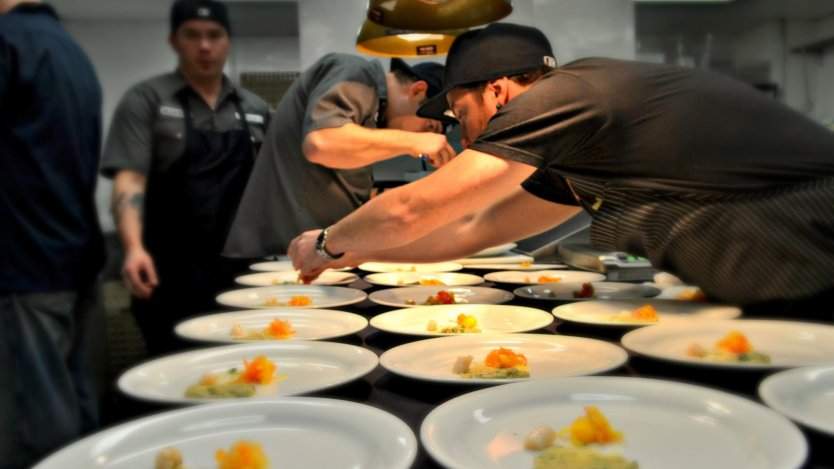Have you ever sat near a busy, open kitchen on a Saturday night, overheard the back-of-house team and wondered what the heck they were talking about? What is a mise and what does it mean to work the pass? Well, these kitchen terms will definitely ensure that you can talk the talk – even if you'd rather not walk the walk.
A la minute
Sorry to disappoint you, but most restaurant dishes are not made 100 per cent to order. As a patron, you should probably thank chefs for this, as it would simply take too long to prepare certain items from scratch, right when you place your order. However, there are certain items that are made a la minute, which is French for “to the minute”. For example, they might sear off your steak, deglaze the pan and make a quick sauce to serve with it.
Soups, however, are definitely made in advance; they probably wouldn't taste right if they weren't.
All day
During a busy service, the chef or expeditor (the person reading off the orders) might call out something like, “Two halibuts all day,” meaning that there are two orders of that dish currently on the queue. It is a quick way to ensure that none of the order have been missed, and all of the cooks know what they are working on.
Chit
This is just another name for the ticket that the kitchen receives for each table, indicating what they have ordered. Chefs are sure to hear these coming with the click-click noise they make as they are printed out of the machine. I tell you, that noise is an indicator of (welcomed) impending doom. When the chit machine starts to pick up, you better be ready to get slammed (see “in the weeds”)!
Covers
The number of tables that a restaurant has served during a service is also referred to as the number of “covers” they did. People love to brag about how many covers they did on a busy night but in reality, it is all pretty relative. The volume of food that a kitchen produces is really dependent on the size of the restaurant and the complexity of food they are serving. In theory, a large scale casual pub will serve more covers than a 20-seat fine dining restaurant.
Deuce
Nothing groundbreaking: it's a table of two guests.
Fire!
When you hear this, it is time to start cooking! Sometimes orders are fired, or made, right when they are received whereas other times they have to be delayed to ensure that the timing is spot on. For example, if a table orders appetizers and entrees, the appies are fired first so that they can be eaten first. Then the mains are fired while they are eating, or when they are done, depending on how long they take to prepare.
Heard
An acknowledgement that a request or order has been heard. Go figure! From my experience, people have a love-hate relationship with this word. I have worked in a kitchen where no one used it but I have also worked with someone who used it every five seconds and everyone just wanted him to shut up. We get it, you heard, we hear, now let’s all be quiet!
In the weeds
It's inevitable. At some point during service, you are going to have so many orders thrown at you that it’s a surprise if the operation does not go down in flames, literally. You are slammed with orders and now you are paying for it. Some people get an adrenaline rush from the chaos but I have only one word for it: stressful. Well, maybe two words: stressful and meltdown.
Kitchen equipment: Robot Coupe, salamander, combi
At home, you probably have an oven, some pots and pans and maybe a few kitchen toys, but let me tell you, it is nothing like the equipment you get to use in a professional kitchen. Who wants to use a dinky little crème brûlée torch when you can bust out a full-on industrial one? Some terms to know are Robot Coupe, just like your food processor but the motor can go forever; salamander -- don’t worry, it’s not a lizard, it’s just the broiler; and combi, a fancy “combination” oven that has convection and steam features.
Mise (short for mise en place)
Without your mise, you are nothing. French for “everything in its place,” mise en place is what cooks live or die by. It includes all of the ingredients that you need to assemble your dishes on a given evening. You better make sure you have everything ready to go because the last thing you want to do during a busy service is start mincing up more parsley.
If you want to learn some more French culinary terms, we've got a list right here!
On the fly
Either a server forgot to place an order or you forget to make it. Regardless, they need their food and they need it now. More like they needed it yesterday and now you better get your ass in gear and make it!
Pick up
The culmination of all of your hard work -- at least for now. “Pick up, table two” is an indication that the food is ready for the servers to take it to the guests. That’s one table down, now only 20 more to go!
Stretch it
You are running out of sauce, can you make it until the end of service? Well you sure as heck are going to try! In a perfect world, you never want to stretch anything because, chances are, it will lose its integrity, especially if you do something like water it down. The easiest way to stretch something is to simply give a smaller portion. Next time you think that they went a little skimpy on the sauce, you'll know that they were probably running a tad low.
The line
Where all of the magic (cooking) happens. Working the line is not for everyone but it sure is impressive to watch seasoned cooks crank out hundreds of covers on a busy night. Forget going to the ballet, all you need is a front row seat at the bar in front of an open kitchen.
The pass
When dishes are completed, they are transferred up to the pass until servers come to take them to their respective tables.
86 it
Something you never want to hear, because when a dish gets 86’d, it means that they are all out. The origins of the term are up for debate, but the implication is clear: disappointment. The primary goal of any restaurant is never to run out of food. The last thing you want to do is tell a customer that you don't have what they want.













